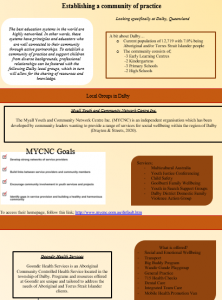24 Establishing communities of practice: Dalby
Brianna Parker
I wish there was a community of practice where you could talk to other educators who are experiencing similar challenges. The fact is, we’re time-poor, dispersed, and in many cases, we’re each other’s competition. To bridge that gap and focus on some of our big issues will be how we have our impact. Given the challenges in our sector, how can we create communities of practice for early years educators interested in multicultural education?

Download the resource: Parker Intercultural
Quality teaching is not an individual process. In fact, it is the result of a collaborative culture that works towards empowering educators to team up to improve student outcomes (Victoria State Government, 2018). Underpinning this concept is Vygotsky’s (1978) social constructivist theory that posits that knowledge is co-constructed and individuals learn from one another. The Australian Professional Standards for Teachers also directs schools to collaborate on all aspects of teaching, including planning, decision making and problem solving (Australian Institute for Teaching and School Leadership, 2017). However, in many cases, educators struggle to find appropriate resources to create a community of practice.
With this information in mind a digital resource, ‘Establishing a community of practice’, was designed in order to meet the key concern of the educators. Dalby was used as the focus area in this resource, as it is a rural town and as such developing a community of practice can be challenging. In order to do so, a range of community organisations and networks were provided as recommendations for educators in the region to utilise when building professional relationships to foster skills and understanding, especially in relation to Aboriginal and Torres Strait Islander students.
The Myall Youth and Community Network Centre Inc. (MYCNC) is an existing group of dedicated community leaders who aim to bridge the gap of social disconnectedness and provide services for the Dalby district (Drayton & Streets, 2020). This centre has been included within the resource as the Multicultural Australia service visits weekly for community members to attend and raise issues for further discussion and exploration. Goondir Health Services (2020) was another resource mentioned which offers educators with community services specific to their Indigenous students. The Alice Springs (Mparntwe) Education Declaration (Education Council, 2019, p. 5) states that:
all Australian Governments will work with the education community to . . . ensure that learning is built on and includes local, regional and national cultural knowledge and experience of Aboriginal and Torres Strait Islander peoples and work in partnership with local communities.
By working alongside the community networks contained in the digital resource, educators can support Aboriginal and Torres Strait Islander students to feel welcomed and valued, whilst also supporting all of the students to flourish in a multicultural society.

